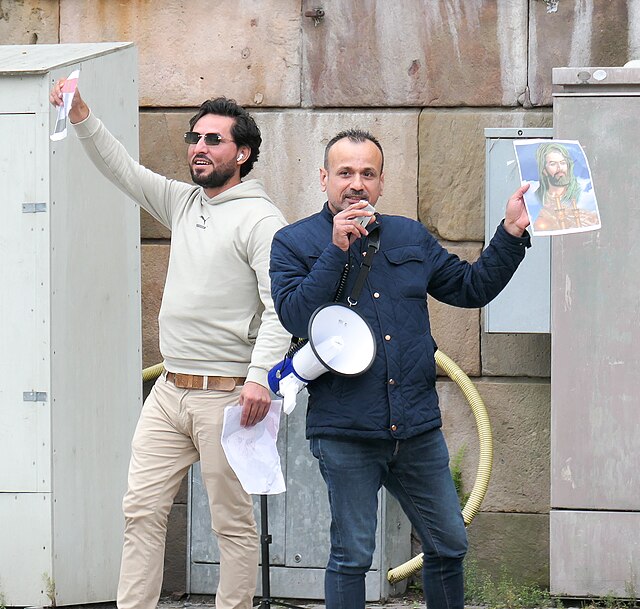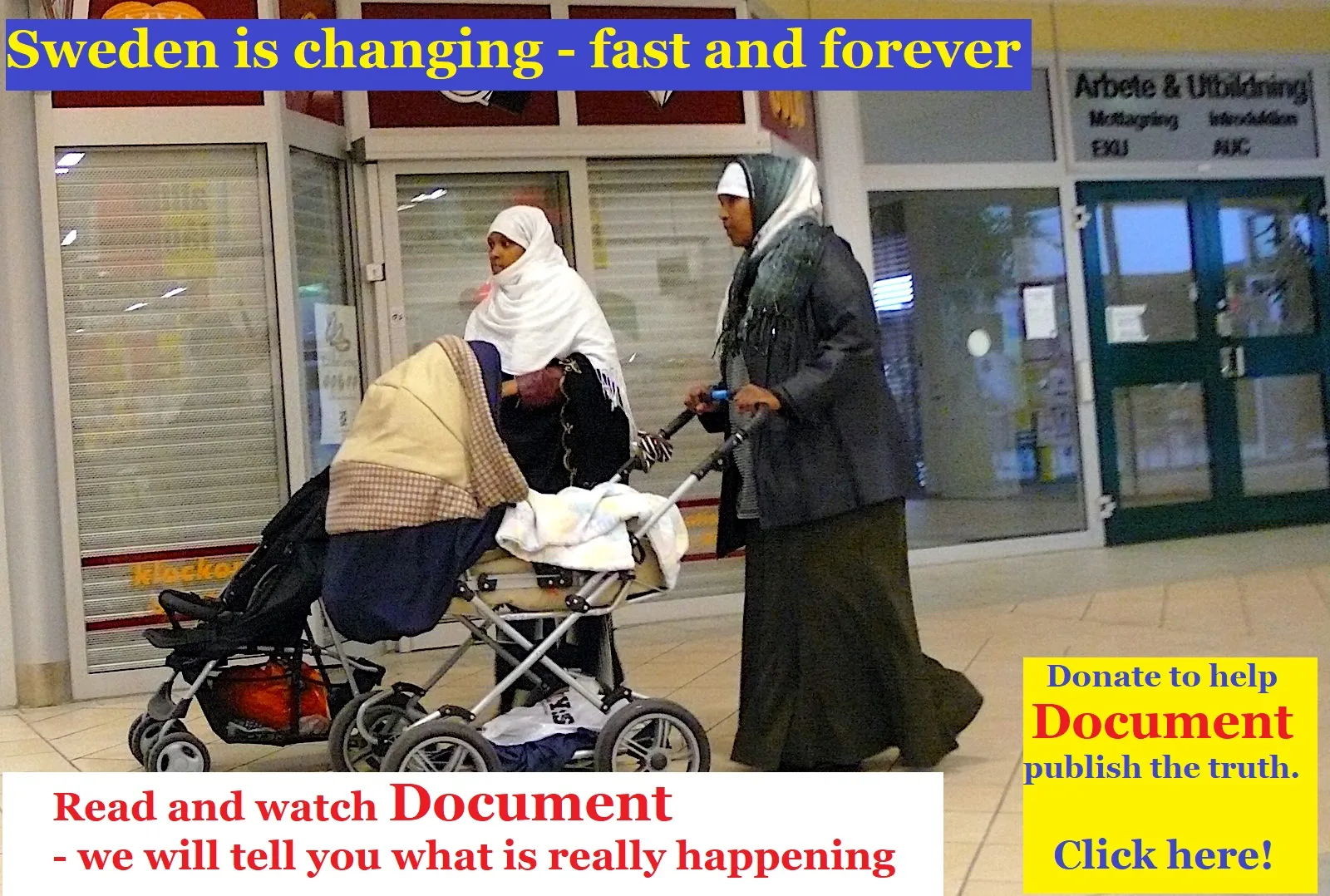Salwan Momika was murdered on Wednesday, sentenced to death by Islamists after criticising Islam and burning the Koran.
Today, his partner, Salwan Najem, was convicted of «incitement against ethnic groups» by the district court. But the message is clear: Criticism of «a certain religion» is associated with the death penalty, even in Sweden.
Both men, consistently referred to as «Koran burners» by the Swedish media, were charged with the crime of «incitement against a group of people» (HMF) after burning copies of a particular green-covered book on a number of occasions. Salwan Najem has now been sentenced to a suspended sentence and daily fines by Stockholm District Court. Salwan Momika’s death sentence was carried out less than a week ago. Or as Aftonbladet puts it: «Momika’s murder made a judgement against him impossible.»
Allowed to burn books…
The verdict shows that it is perfectly legal to burn books – all books – and that it is legal to criticise religions – all religions – in Sweden’s freedom of expression. Some people therefore believe that anyone who has claimed that the HMF legislation is in practice a blasphemy law has now been proven wrong.
«The scope for being objectively and legitimately critical of a religion in an open debate can be considered very large. In such a context, one must also tolerate that some religious practitioners perceive a critical message as offensive,» writes Stockholm District Court in the judgement. At the same time, the judge believes that Salwan Najem «has clearly exceeded the bounds of objective and valid debate and criticism».
As a result, Salwan Najem has been convicted of «expressing contempt for the Muslim community because of their religious beliefs» on four occasions. The chairman of the case against Momika and Najem, Judge Göran Lundahl, formulates his position as follows:
– Within the framework of freedom of expression, there is a great deal of scope to be critical of a religion in a factual and valid debate. At the same time, speaking out about religion does not give you a free pass to do or say anything without the risk of offending the group that holds that belief.
… but not to “risk offending” …
What the judge is saying is that you are allowed to criticise – but at the same time you are not allowed to say or do anything that «risks offending» someone. So what does that mean in practice? Well, you can practically never express any form of criticism, because with a hundred per cent guarantee there will always be someone who «risks» feeling «offended».
Or more correctly: You can express yourself as critically as you like towards all religions – except one, namely [fill in the blank]. I can’t write the religion here, because I risk someone feeling offended. I can, however, write that it is free to not only criticise, but also mock, ridicule, deny and hate Christianity, Buddhism, Judaism, Hinduism, Asatru, Wicca, Taoism and so on. Of course, some may feel offended – but nothing will happen.
You won’t be convicted in court like Najem or sentenced by a mob like Momika if you stand on Mynttorget in Stockholm and show pictures from Ecce Homo where Jesus is portrayed as an HIV-infected homosexual, burn copies of the Bhagavad Gita in every city or post Facebook posts where witches fly to Blåkulla on broomsticks.
…a certain religion…
No one has even been charged with HMF during the recurring pro-Palestinian demonstrations following the terrorist attacks on 7 October, despite Hitler salutes, posters and battle cries of from the river to the sea and that «it’s time to finish what Hitler started». Well, no. It’s going great. But try criticising «a certain religion», that religion’s imposed dress code for kindergarten children, or the character of that religion’s so-called prophet (who is considered the ideal for any follower of that religion) and see what happens. And this is where it gets interesting. No-one with any sense of self-preservation will do it – because we know what happens then.
The most important thing in the verdict is that it emphasises that criticism of religion is not a crime, writes Oisin Cantwell in Aftonbladet.
But. Because there’s always a «but».
But during the demonstrations to which this indictment relates, it was proclaimed that Mohammed was mentally ill, that he was a ‘rapist’, ‘pimp’ and ‘child-fucker’, to name a few of the less sophisticated claims…
So what do we call a middle-aged man who marries a six-year-old girl, and has sex with her when she’s nine years old? What would we call a gang leader who murders his opponents and then hands out his opponents’ wives to his cronies? What do we call a leader of an armed gang who murders entire villages – men, women and children? What words does the Stockholm District Court think we should use to describe such things? «Individual with norm-breaking behavioural values?»
… because then!
At least now we know what happens to those who dare to speak out: At best, they’ll be sentenced by Sweden’s official judicial authorities, like Najem. At worst, you’ll be judged by Sweden’s extra-parliamentary bodies, like Momika.
But at the same time, there is no guarantee that Salwan Najem will not suffer the same fate as his colleague. Najem himself believes that he is next in line for the assassins, and from the (lack of) reactions from our politicians and heads of government, we understand that there is no one who will protect him. Or us, the day our names end up on the death list of the offended Islamists.
National Police Chief Petra Lundh was asked in Rapport whether Salwan Momika had full bodyguard protection.
«We never comment on these issues in individual cases, for security reasons,» replied the National Police Chief with an impressive and confidence-inspiring authority that can be admired in the screenshot below.

Sweden’s national police chief Petra Lundh. Photo: Screenshot Rapport
Sentencing yourself to death
Not surprisingly, the old Swedes are silent. Instead, it’s people who have fled from, or have their own experiences of, Islamist oppression who point out the obvious: Sweden is running the Islamists’ errands. Swedish politicians, together with the Swedish media, obedient civil servants and an equally obedient Swedish church, have contributed to the fact that we now live in a society that has submitted.
Instead of setting limits on the intolerant and violent ideology and its adherents, the focus has been on punishing those who have tried to demonstrate the ideology’s intolerance and propensity for violence. Nima Rostami writes in a Facebook post:
The Swedish political elite has brazenly and systematically promoted Islam and betrayed the Swedish people. With migration as an instrument and the policy of appeasement, Sweden has been transformed into the toxic sinkhole of MENA countries, which has led to Sweden now struggling with the negative consequences of a misguided migration policy.
In line with this misguided migration policy, critics of Islam have been left to the wolves and labelled as racists. Those who criticise the political aspirations of Islam are not widely protected, in order to please Muslims. Instead of protecting those who dare to stand up against Islamism, they are labelled and persecuted even in Sweden.
That’s right. Ayaan Hirsi Ali calls Sweden «a textbook example of a failed state» and I believe that the country has passed the point of no return. The Islamists are given free rein while whistleblowers are penalised in one way or another. The inability to protect Salwan Momika despite the extreme threat to him caused his death, and the people arrested and still suspected of the murder were released within hours. The outcry the murder has generated on social media shows that the killers have a taste for blood.
Salwan Najem therefore has every reason to fear for his life and the message to Sweden, the Swedes – and the Islamists – is impossible to misunderstand: You are of course free to criticise «a certain religion» – but if you exercise that freedom, you risk condemning yourself to death.


